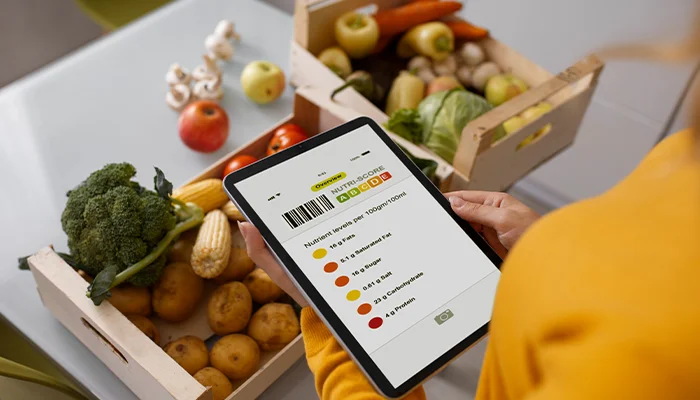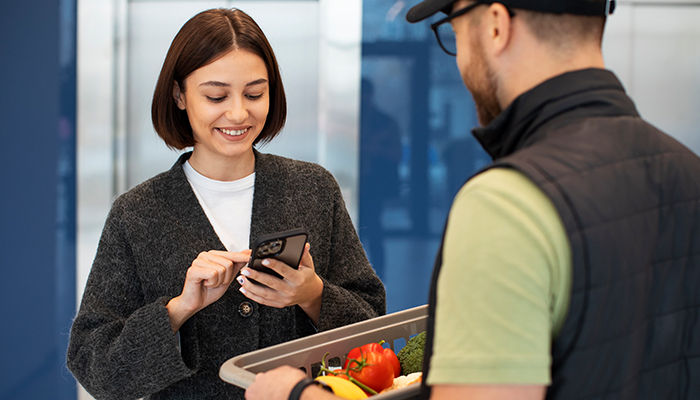Leading Grocery Delivery Apps are Making Waves in Saudi Arabia

JUL, 04, 2024 16:55 PM
Leading Grocery Delivery Apps are Making Waves in Saudi Arabia
In recent years, the grocery delivery market in Saudi Arabia has experienced a significant transformation. With an ever-growing population, increasing internet penetration, and a rising demand for convenience, grocery delivery apps have emerged as essential tools for many consumers in the Kingdom. These apps offer a plethora of features designed to meet the unique needs of Saudi consumers, providing a seamless and efficient shopping experience. This article delves into the leading grocery delivery apps in Saudi Arabia, explores the dynamics of the grocery delivery market, and discusses the profound impact these apps have on consumers and businesses alike.
The Grocery Delivery Market in Saudi Arabia
The grocery delivery market in Saudi Arabia has seen unprecedented growth in recent years, driven by a combination of socio-economic factors, technological advancements, and changing consumer behaviors. This surge has fundamentally transformed how people shop for groceries, offering them convenience and efficiency. Let's delve deeper into the key factors contributing to this rapid growth:
Urbanization
Urbanization has been a significant driver of the grocery delivery market's expansion in Saudi Arabia. As the country continues to urbanize at a rapid pace, more people are moving to cities and urban centers. This shift has several implications:
- Increased Population Density: Urban areas in Saudi Arabia are becoming increasingly populated. With more people living in close proximity, the demand for efficient and convenient shopping options has risen. Grocery delivery services cater to this demand by providing a way to shop without navigating crowded supermarkets.
- Busy Lifestyles: Urban residents often lead busy, fast-paced lives, juggling work, family, and social commitments. For many, finding the time to visit a physical store can be challenging. Grocery delivery apps offer a solution by allowing consumers to shop at their convenience, whether late at night or during a lunch break.
- Limited Retail Space: As cities become more crowded, the availability of retail space decreases. Grocery stores in urban areas may face constraints in terms of size and stock. Delivery services can help alleviate these constraints by providing access to a wider range of products without the need for large physical stores.
- Traffic and Transportation: Navigating through urban traffic can be time-consuming and stressful. Grocery delivery apps help consumers avoid the hassle of driving to and from stores, finding parking, and carrying heavy bags.
Technological Advancements
The technological landscape in Saudi Arabia has evolved dramatically, contributing significantly to the growth of the grocery delivery market.
- Smartphone Penetration: Saudi Arabia boasts a high smartphone penetration rate, with the majority of the population owning and using smartphones regularly. The widespread use of smartphones has made it easier for consumers to access grocery delivery apps.
- Internet Connectivity: The country has invested heavily in improving internet infrastructure, resulting in high-speed internet access for a large portion of the population. Reliable internet connectivity is crucial for the smooth functioning of grocery delivery apps, enabling consumers to browse products, place orders, and track deliveries in real time.
- User-Friendly Apps: The development of intuitive and user-friendly apps has played a critical role in the adoption of grocery delivery services. These apps are designed to provide a seamless shopping experience with features such as easy navigation, secure payment options, and real-time order tracking.
- Data Analytics and AI: Advanced technologies like data analytics and artificial intelligence (AI) are being used to enhance the functionality of grocery delivery apps. These technologies help in personalizing the shopping experience by offering tailored recommendations, optimizing delivery routes, and managing inventory effectively.
COVID-19 Pandemic
The COVID-19 pandemic has had a profound impact on consumer behavior, accelerating the adoption of online grocery shopping.
- Social Distancing: During the pandemic, social distancing measures were implemented to reduce the spread of the virus. Consumers turned to online grocery shopping to minimize physical contact and avoid crowded places, leading to a surge in the use of grocery delivery apps.
- Health and Safety Concerns: The fear of contracting the virus pushed many consumers to seek safer shopping alternatives. Grocery delivery services provided a way to obtain essential items without leaving the safety of their home.
- First-Time Users: The pandemic introduced many people to online grocery shopping for the first time. Even as restrictions have eased, many of these first-time users have continued to use delivery services, appreciating the convenience and efficiency they offer.
- Expansion of Services: To meet the increased demand during the pandemic, many grocery delivery services expanded their offerings, including contactless delivery options, enhanced hygiene protocols, and special services for vulnerable populations.
Changing Consumer Preferences
Modern consumers in Saudi Arabia are increasingly valuing convenience and time-saving solutions, leading to a shift in shopping behaviors.
- Convenience: Consumers are looking for ways to simplify their lives and reduce the time spent on routine tasks. Grocery delivery apps offer a convenient solution by allowing them to shop from anywhere, at any time, without the need to visit a physical store.
- Customization and Personalization: Today's consumers expect personalized experiences. Grocery delivery apps use data analytics to understand consumer preferences and provide tailored recommendations, making the shopping experience more relevant and enjoyable.
- On-Demand Culture: The rise of the on-demand economy has influenced consumer expectations. People are accustomed to getting what they want when they want it. Grocery delivery apps cater to this expectation by offering fast and flexible delivery options.
- Health and Wellness: There is a growing awareness of health and wellness among Saudi consumers. Grocery delivery apps often provide detailed product information, including nutritional facts and sourcing details, helping consumers make informed choices about their purchases.
- Sustainability: Increasingly, consumers are becoming more environmentally conscious. Many grocery delivery services are responding to this trend by offering eco-friendly options, such as reusable or minimal packaging, and sourcing locally produced goods.
Leading Grocery Delivery Apps in Saudi Arabia

1. HungerStation
HungerStation stands out as one of the most popular grocery delivery apps in Saudi Arabia. Initially launched as a food delivery service, HungerStation has expanded its offerings to include groceries, making it a comprehensive solution for all consumer needs.
- Features:
- Extensive range of products from various supermarkets.
- Real-time tracking of orders, allowing consumers to see the status of their delivery.
- Multiple payment options are available, including cash on delivery, credit or debit cards, and mobile wallets.
- User-friendly interface with seamless navigation, making it easy to browse and order products.
- Impact:
- HungerStation has significantly enhanced consumer convenience by offering a diverse range of products at competitive prices.
- The app has established b partnerships with local supermarkets, ensuring product availability and timely deliveries.
- Its expansion into grocery delivery has made it a one-stop solution for various consumer needs, from meals to household essentials.
2. Carrefour Now
Carrefour Now is the grocery delivery service offered by the international retail giant Carrefour. Known for its vast product selection and quality, Carrefour Now has become a go-to choice for many Saudi consumers.
- Features:
- Extensive range of groceries, household items, and fresh produce.
- Same-day delivery service, ensuring that customers receive their orders promptly.
- Exclusive discounts and promotions are available for app users, helping them save on their grocery bills.
- Integration with Carrefour's MyCLUB loyalty program, allowing users to earn and redeem points on their purchases.
- Impact:
- Carrefour Now's commitment to quality and customer satisfaction has earned it a loyal customer base.
- The app's efficient delivery system ensures that customers receive their orders promptly, enhancing their shopping experience.
- Carrefour's reputation for quality and reliability extends to its delivery service, building trust among consumers.
3. Danube
Danube, a well-known supermarket chain in Saudi Arabia, has gained immense popularity for its grocery delivery app. The app offers a seamless shopping experience with a b focus on quality and convenience.
- Features:
- Wide variety of products, including fresh produce, dairy, and bakery items.
- Scheduled delivery slots to suit customer preferences, allowing users to choose a convenient delivery time.
- User-friendly app interface with easy navigation and a streamlined ordering process.
- Option to create and save shopping lists for future orders, making it easier to reorder favorite items.
- Impact:
- Danube's emphasis on quality and freshness has made it a trusted name in the grocery delivery market.
- The app's personalized shopping lists and scheduled deliveries offer unmatched convenience to users.
- By focusing on fresh and high-quality products, Danube has built a reputation for reliability and customer satisfaction.
4. Jumia
Jumia, a well-established e-commerce platform in Africa, has successfully entered the Saudi Arabian market with its grocery delivery service. Jumia's app provides a comprehensive range of products at competitive prices.
- Features:
- Extensive product catalog, including groceries, household items, and electronics.
- User-friendly interface with easy product search and filtering options, making it simple to find desired items.
- Multiple payment methods are available, including mobile wallets, credit/debit cards, and cash on delivery.
- Regular promotions and discounts are available for app users, helping them get the best deals on their purchases.
- Impact:
- Jumia's competitive pricing and diverse product selection have attracted a wide customer base in Saudi Arabia.
- The app's efficient delivery network ensures timely deliveries, enhancing customer satisfaction.
- By offering a broad range of products, Jumia has become a convenient option for various consumer needs, from groceries to electronics.
5. Nanobox
Nanobox is a specialized grocery delivery app focusing on delivering fresh produce directly from farms to consumers' doorsteps. It has gained popularity for its commitment to quality and sustainability.
- Features:
- Fresh, locally-sourced produce, ensuring high quality and support for local farmers.
- Subscription options for regular deliveries provide convenience for consumers who prefer scheduled deliveries.
- Detailed product information, including sourcing and nutritional facts, helps consumers make informed choices.
- User-friendly interface with easy ordering and tracking, making the shopping experience smooth and hassle-free.
- Impact:
- Nanobox's emphasis on fresh and sustainable produce has resonated with health-conscious consumers.
- The app's subscription model provides consistent and reliable service, making it a preferred choice for regular grocery shoppers.
- By sourcing locally, Nanobox supports the local economy and promotes sustainable agricultural practices.
The Impact of Grocery Delivery Apps on Consumers
The rise of grocery delivery apps in Saudi Arabia has had a profound impact on consumers in several ways:
- Convenience: Grocery delivery apps save time and effort, allowing consumers to shop from the comfort of their home. This is particularly beneficial for busy professionals, families, and individuals with mobility challenges.
- Variety: These apps offer a wide range of products, including local and international brands, ensuring that consumers have access to diverse options. Whether consumers are looking for specialty items or everyday essentials, they can find what they need with ease.
- Promotions and Discounts: Apps frequently offer exclusive promotions and discounts, helping consumers save money on their grocery bills. These deals make online grocery shopping not only convenient but also cost-effective.
- Contactless Shopping: The COVID-19 pandemic has made contactless shopping more important than ever. Grocery delivery apps provide a safe and convenient way to shop without physical interaction, reducing the risk of virus transmission.
- Personalized Experience: Many apps offer personalized recommendations and shopping lists based on user preferences, enhancing the overall shopping experience. This personalization makes shopping more efficient and enjoyable for consumers.
The Impact of Grocery Delivery Apps on Businesses
Grocery delivery apps have also had a significant impact on businesses, particularly supermarkets and local retailers.
- Increased Reach: By partnering with grocery delivery apps, businesses can reach a wider audience, including customers who prefer online shopping. This expanded reach helps businesses tap into new markets and customer segments.
- Improved Sales: The convenience and accessibility of grocery delivery apps have led to increased sales for many retailers. By offering online shopping options, businesses can boost their revenue and stay competitive in the market.
- Brand Visibility: Being featured on popular grocery delivery apps enhances a retailer's brand visibility and recognition. This increased exposure helps businesses attract new customers and build brand loyalty.
- Customer Insights: Apps provide valuable data on consumer preferences and shopping habits, allowing businesses to tailor their offerings and marketing strategies. This data-driven approach helps businesses meet customer needs more effectively.
- Operational Efficiency: Grocery delivery apps streamline the order and delivery process, reducing the burden on in-store staff and improving overall operational efficiency. By automating and optimizing logistics, businesses can enhance their service quality and reduce costs.
Challenges in the Grocery Delivery Market
While the growth of grocery delivery apps in Saudi Arabia is promising, there are several challenges that both consumers and businesses face:
- Logistics and Infrastructure: Ensuring timely and efficient delivery can be challenging, especially in densely populated urban areas or remote locations. Businesses need to invest in robust logistics and delivery infrastructure to meet customer expectations.
- Quality Control: Maintaining the quality and freshness of products during delivery is crucial. Businesses must implement strict quality control measures to ensure that customers receive fresh and high-quality items.
- Competition: The increasing number of players in the grocery delivery market has intensified competition. Businesses must differentiate themselves through superior service, unique offerings, and competitive pricing to stay ahead.
- Customer Trust: Building and maintaining customer trust is essential for the success of grocery delivery apps. Businesses need to ensure transparent pricing, accurate product descriptions, and reliable customer service to earn and retain customer loyalty.
- Regulatory Compliance: Adhering to local regulations and standards is important for the smooth operation of grocery delivery services. Businesses must stay updated on regulatory changes and ensure compliance to avoid legal issues.
The Future of Grocery Delivery in Saudi Arabia
The future of grocery delivery in Saudi Arabia looks promising, with several trends and developments expected to shape the market:
- Technological Advancements: Innovations such as AI, machine learning, and data analytics will enhance the functionality and user experience of grocery delivery apps.
- Sustainability: There will be a growing emphasis on sustainable practices, including eco-friendly packaging and sourcing locally-produced goods.
- Expansion of Services: Grocery delivery apps will continue to expand their services, offering more than just groceries. This could include meal kits, ready-to-eat meals, and household services.
- Increased Competition: As the market grows, more players are likely to enter, leading to increased competition and better services for consumers.
- Regulatory Changes: Government regulations and policies may evolve to support the growth of the online grocery market, ensuring fair practices and consumer protection.
Conclusion
Grocery delivery apps have revolutionized the way people shop for groceries in Saudi Arabia. Leading apps like HungerStation, Carrefour Now, Danube, Jumia, and Nanobox have made significant strides in meeting consumer demands for convenience, variety, and quality. These apps not only benefit consumers by providing a seamless shopping experience but also offer businesses new opportunities for growth and efficiency. As technology continues to evolve and consumer preferences shift, the grocery delivery market in Saudi Arabia is poised for further expansion and innovation.
For more information or to get in touch with us regarding the latest trends and insights in the grocery delivery market, feel free tocontact us.
Strategy
Design
Blockchain Solution
Development
Launching
Testing
Maintenance
Contact US!
India

Plot 378-379, Udyog Vihar Phase 4 Rd, near nokia building, Electronic City, Phase IV, Sector 19, Gurugram, Haryana 122015
Copyright © 2025 PerfectionGeeks Technologies | All Rights Reserved | Policy
Contact US!
India 
Plot 378-379, Udyog Vihar Phase 4 Rd, near nokia building, Electronic City, Phase IV, Sector 19, Gurugram, Haryana 122015
Copyright © 2025 PerfectionGeeks Technologies | All Rights Reserved | Policy







